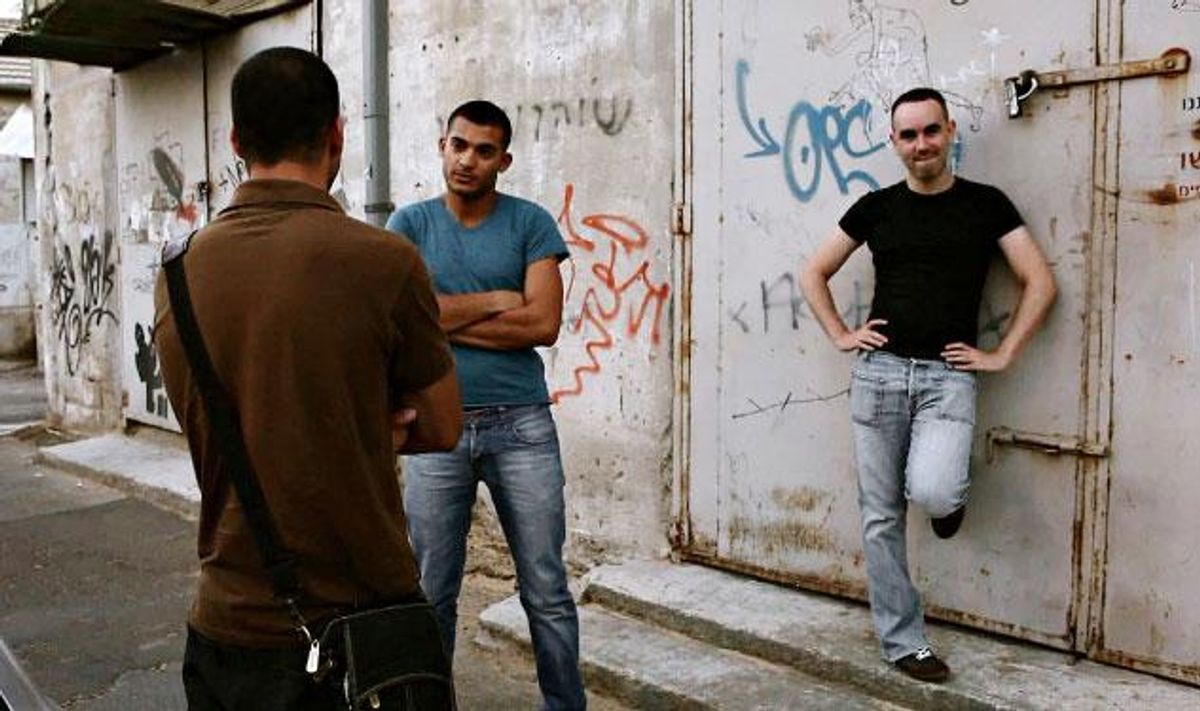News & Opinion
Twice Divided

For gay Palestinians, Tel Aviv is a precarious and complicated sanctuary.
October 15 2012 10:02 AM EST
February 05 2015 9:27 PM EST
By continuing to use our site, you agree to our Private Policy and Terms of Use.

Photo courtesy of The Invisible Men
Ra'ed, a soft-spoken Israeli-Palestinian man in his forties, lives in south Tel Aviv with Ahmad, his devilishly handsome boyfriend. They are both from small Arab villages in the north of the country.
In Tel Aviv, Ra'ed, Ahmad, and their friends live an ordinary life by many standards -- they go out dancing "at least once a week," Ahmad says; they have friends over for meals; they go to the beach. Yet, lurking behind their stories -- of existing between two binary cultures and proscribed sexual identities -- is the contentious nature of queer Palestinian activism.
Palestinian society is inherently divided: first, between Palestinians who live in Israel as citizens and those under occupation in the West Bank or in Gaza. Their struggle is further split between those who see their role as part of the global LGBT movement and others who view Palestinian gay rights advocacy as part of the struggle against Israel.
Israel has accepted hundreds of individual gay Palestinian asylum-seekers from the West Bank and Gaza; it has also deported many who entered the country illegally. In 2008, two Tel Aviv University lawyers published a study, "Nowhere to Run: Gay Palestinian Asylum-Seekers in Israel," in which they claimed Israel, a signatory to the 1951 Refugees Convention, didn't provide enough of a haven to gay Palestinians seeking refuge.
Those issues come under scrutiny in The Invisible Men, a new documentary by Yariv Mozer and Adam Rosner, that depicts gay Palestinians running from danger in their own society and skirting authorities while hiding in Israel. Their struggle is the elusive quest for safety -- with nowhere to go, no place to hide.
Mozer's documentary was inspired by his own curiosity about the experience of gay Palestinians "on the other side of the separation wall." He met Louie, a gay man in his thirties, originally from the West Bank, who had been hiding in Tel Aviv for nearly 10 years. "When Louie's family found out he was gay, his father tied him up with ropes and slashed his face with a knife," Mozer explains. "He left home with a scar on his face. The story really struck me, so I decided to make a film about it."(Louie now has residency in a third country.)
"I wasn't trying to depict Tel Aviv as a 'safe haven,' " Mozer says. "Because for [the gay Palestinians hiding within the city], it wasn't safe," says Mozer. "True, Tel Aviv's the only place in the Middle East that's liberal and where they can be openly gay -- but their coming here is a logical thing. It's not connected to politics." He points out that gay Palestinians who are given permanent residency within Israel "are rare or unique cases."
Will Louie ever come back to Tel Aviv? "It wouldn't be very wise, and he knows it," Mozer says. "People who have Palestinian origin have a very difficult time getting into Israel; I don't think they really want to."
Want more breaking equality news & trending entertainment stories?
Check out our NEW 24/7 streaming service: the Advocate Channel!
Download the Advocate Channel App for your mobile phone and your favorite streaming device!